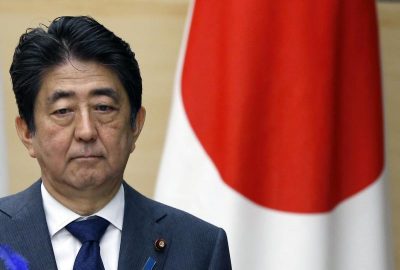
All Global Research articles can be read in 51 languages by activating the “Translate Website” drop down menu on the top banner of our home page (Desktop version).
To receive Global Research’s Daily Newsletter (selected articles), click here.
Follow us on Instagram and Twitter and subscribe to our Telegram Channel. Feel free to repost and share widely Global Research articles.
***
On July 8 former Japanese Prime Minister Shinzo Abe was shot twice by an assailant with a homemade gun. Having suffered critical wounds, Abe collapsed and was transported to a hospital where he was later pronounced dead. The assassination of Abe immediately sent shockwaves through Japanese domestic politics and global diplomacy. The long-time prime minister was almost certainly the most consequential figure in post-Cold War Japanese politics, and arguably in Japanese foreign policy since 1945. How should we remember him and how will history judge him?
Military Reconstruction
Abe led the movement to reinterpret Article 9 of the Japanese constitution to allow more varied and vigorous kinds of military policy.
Long interpreted as a ban on offensive military activity (and indeed possibly any kind of military institutionalization at all), Article 9 put what many believed were sensible limits on Japan’s ability to wage war. Given the enormous size and sophistication of Japan’s economy, this has the potential to harness Japan’s nearly limitless latent military power.
Given the growth of Chinese military power, many in both Japan and the United States saw this reinterpretation as a positive good, while many in East Asia worried about Japanese revanchism.
On the hardware side, Abe helped spearhead the acquisition of important new capabilities, including the V-22 Osprey, the F-35B, and the Izumo class light carriers. Japan also stepped up the development of its own stealth fighter, in cooperation with the United Kingdom.
Abe’s advocacy helped produce a cultural shift in military thinking in Japan, with more Japanese than ever expressing willingness to contemplate overseas deployments and strikes on overseas targets.
China
In no small part because of his assertive stance on Japanese security policy, Abe Shinzo won few friends in China.
As with South Korea, China did not have a sense of humor about Abe’s disinterest in accepting responsibility for Japanese atrocities during World War II. His decision to visit the Yasukuni Shrine helped spark violent demonstrations in China, even though the Sino-Japanese economic relationship remained healthy. Even on this latter point, Abe’s record was viewed askance by the Chinese, as he opened to door to disengagement from joint technological projects and supply chains.
Abe’s death was celebrated on social media in China, even as the government and mainstream media outlets remained more reserved.
South Korea
Abe Shinzo’s greatest failure may have been the damage that he inflicted upon Tokyo’s relationship with Seoul.
At a moment when trends in East Asian security politics (growing Chinese power, North Korean nuclear adventurism) should have pushed South Korea and Japan together, Abe badly botched the question of Japanese responsibility for depredations against Korea and Korean citizens before and during World War II.
In particular, Abe unnecessarily angered South Koreans by soft-pedaling the “comfort woman” question, which involved the use of Koreans as sex slaves for Japanese soldiers during the Pacific War. The Japanese Army also frequently conscripted Korean men for nearly suicidal duty on islands across the Pacific.
Abe’s treatment of South Korean concerns was appalling in its own right but also represented a political blunder, as it did little to help him at home and gave voice to critics in China, the United States, and elsewhere who worried about Japan’s willingness to grapple with its wartime legacy.
It remains unclear the extent to which Abe’s successor can heal that damage, although Prime Minister Kishita Fumio seems to have made improving relations with Seoul a priority.
Abe and History
Shinzo Abe left a complicated global legacy. To his critics in Japan, Korea, and China, he threatened to overturn seventy successful years of Japanese pacifism, potentially reigniting the fires that lit East Asia in the 1930s and 1940s. To his admirers in Japan, the United States, and elsewhere, he helped bring Japan fully into global diplomacy, giving Tokyo an active role in shaping global society and reinvigorating Japanese security policy in an increasingly dangerous world.
It is hard to imagine Tokyo taking as active and critical a stance on Russia as it has without Abe. And there is no doubt that Abe deserved better than an assassin’s bullet, and it remains to be seen how the means of his passing will affect how future generations evaluate his accomplishments.
*
Note to readers: Please click the share buttons above or below. Follow us on Instagram and Twitter and subscribe to our Telegram Channel. Feel free to repost and share widely Global Research articles.
A 1945 Contributing Editor Dr. Robert Farley has taught security and diplomacy courses at the Patterson School since 2005. He received his BS from the University of Oregon in 1997, and his Ph. D. from the University of Washington in 2004. Dr. Farley is the author of Grounded: The Case for Abolishing the United States Air Force (University Press of Kentucky, 2014), the Battleship Book (Wildside, 2016), and Patents for Power: Intellectual Property Law and the Diffusion of Military Technology (University of Chicago, 2020). He has contributed extensively to a number of journals and magazines, including the National Interest, the Diplomat: APAC, World Politics Review, and the American Prospect. Dr. Farley is also a founder and senior editor of Lawyers, Guns and Money.
Featured image is from Oriental Review














